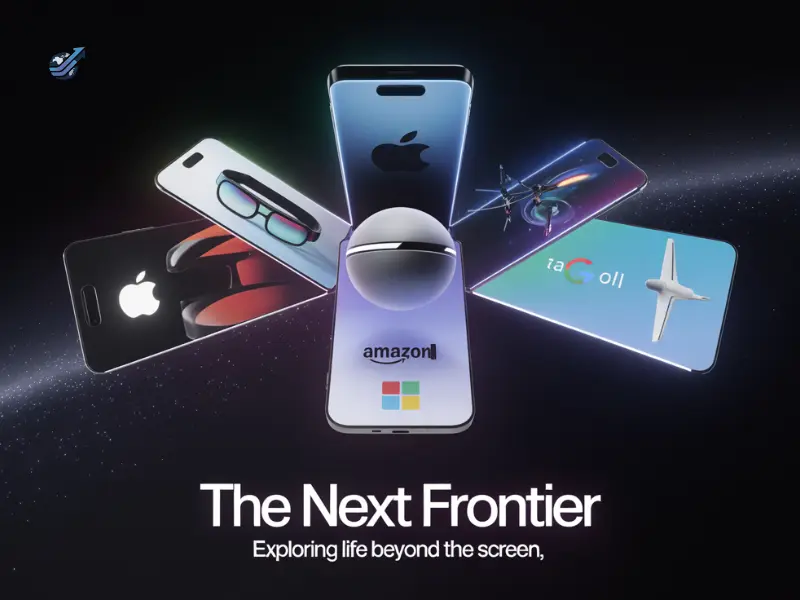Smartphones have become an essential part of daily life helping us communicate navigate shop and stay entertained. But the digital landscape is shifting. While mobile phones including iPhones Android devices and other touchscreen phones continue to dominate Big Tech Giants companies are leading a transformation that goes far beyond what we can hold in our hands.
As we enter the era of smart mobile technology embedded into everything—from our homes to our health—its clear that major technology players are preparing for a post-smartphone world. This article explores five bold innovations through which technology industry leaders like FAMGA (Facebook Apple Microsoft Google Amazon) and other Silicon Valley firms are reshaping life as we know it.
What Is Life Beyond Smartphones
Life beyond smartphones means we are starting to rely less on phones and more on smart technology all around us. This includes tools built into our homes clothes and everyday objects. Instead of using a screen to tap or swipe people now use their voice hand movements or even body signals to control devices. Big tech companies are leading this change. They imagine a world where technology feels easy natural and part of our daily life. And this isn’t just a future idea—its already happening and changing how we live work and have fun.
Smart Homes Are Replacing Screens
Tech giants like Amazon and Google are investing heavily in smart home ecosystems. Devices such as Alexa and Google Nest are already making it possible to control lighting security temperature and entertainment systems without ever picking up a phone.
This evolution marks a significant shift away from next-gen smartphones. In smart homes voice commands and automated routines reduce the need for constant screen interaction. Instead of relying on your iPhone or Android device to turn off the lights or lock the doors a virtual assistant handles it for you.
By building these intelligent environments global tech innovators are making life more convenient and accessible. They are also leading the charge in reducing screen time and promoting healthier digital habits.
Augmented and Virtual Reality Are the New Interfaces
With new tools like Apple Vision Pro and Meta Quest headsets big tech companies are bringing digital worlds right in front of our eyes. These devices let people use apps watch videos and get information in 3D spaces—without using a phone. This isn’t just for fun. Its a big change in how we use technology. Instead of tapping a screen users can move look or speak to control what they see. You can join a meeting play a game or even do your job in a virtual space—without touching your phone.
Top tech companies like Apple Google and Meta are investing a lot in this. They believe AR and VR will soon do many of the things we now use phones for.
Wearables Are Becoming the New Hub
Smartwatches fitness trackers and health bands are changing how we stay connected. Companies like Apple Google and Fitbit are making wearables that do more than just count steps. These tools can check your health let you pay without cash and even send messages without a phone. The big change is that you don’t always need your phone anymore. You can just look at your wrist to do many of the same things. Wearables are small easy to use and very smart.
Tech leaders are building these devices to feel like a part of you. They collect data and use the cloud to give you helpful personal feedback—often faster and easier than using a phone.
AI Is Replacing Manual Input
Artificial intelligence is quickly becoming the foundation of digital life. Assistants like Siri Google Assistant and Alexa are moving beyond simple commands and into predictive automation. These AI-driven systems can schedule appointments suggest purchases and even anticipate your needs based on habits and preferences.
By reducing the need for manual input top tech Giants brands are slowly phasing out some of the everyday uses of mobile phones. Tasks that used to require opening multiple apps and tapping several buttons can now be completed with a single voice command—or no command at all. This development represents a major advancement by tech conglomerates. It transforms technology into something that is always available but no longer always visible. In other words it frees us from our screens without removing digital convenience.
Transportation Is Becoming Smarter and More Connected
The future of mobility is also being shaped by the same Big Tech Giants companies that revolutionized smartphones. Googles Waymo and Tesla supported by Microsoft and Amazon cloud platforms are building smart vehicles that integrate AI sensors and IoT technologies. In this emerging world your car can sync with your calendar recommend routes or even drive itself—without requiring you to interact with a smartphone at all. While handheld devices once served as navigation hubs digital transformation leaders are moving that functionality directly into the environment around us.This innovation doesn’t just improve convenience. It creates smarter cities where wireless communication devices and infrastructure work together to reduce traffic enhance safety and promote energy efficiency.
Benefits and Challenges of Moving Beyond Smartphones
There are many good things about this change. People can use technology in easier more natural ways. Devices can work better for more people and feel less distracting. By spending less time staring at screens people may enjoy healthier lives smarter homes and better workplaces. But there are also some problems. New devices collect more data which raises privacy concerns. We also need stronger internet and systems to support things like 5G and smart tools. And some people may not have access to this new tech which could leave them behind.
Even with these issues this shift shows how technology can grow and improve when its not just about phones.
How Can You Adapt to This Tech Shift
If you want to get ready for life beyond smartphones start by thinking about how often you use your phone. Do you check the weather set reminders or play music on it
Now try using smart tools instead—like voice assistants smartwatches or smart home devices. A smartwatch can track your health and a smart speaker lets you control things without using your hands. You can also try AR apps for fun and interactive experiences. Most importantly keep learning. The more you know about how big tech companies are leading this change the easier it will be to enjoy the benefits.
People Also Ask
What does life beyond smartphones mean
It means using smart technology that works without always needing a phone. This includes tools like voice assistants and smart home systems that work in the background.
Are smartphones becoming outdated
Not yet but things are changing. Many jobs we do on phones are now done by smartwatches voice assistants and other new tech.
Which tech companies are leading this change
Big companies like Apple Google Microsoft Amazon and Meta are leading the way. They are building new tools for life after smartphones.
How are wearables taking the place of phones
Smartwatches can now call text track your health and give directions—just like a phone.
Is this change already happening
Yes. Millions of people already use smartwatches voice tools and smart homes that let them use their phones less often.
Conclusion
The future isn’t just about phones—its about smart connected tools that work all around us. Big Tech companies like Apple Google and others are leading the way into a new digital world beyond smartphones. They’re creating smart homes wearables and AI helpers that fit easily into daily life. This doesn’t mean less technology—it means better Tech Giants that feels natural responds quickly and doesn’t always need a screen.



